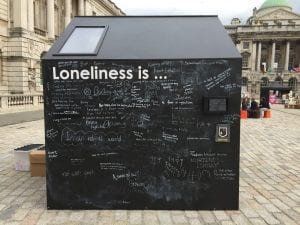
On Friday April 5th the Ageing and the Lifecourse faculty research group held a seminar entitled ‘Loneliness across the lifecourse’. Speakers included James Duggan from Manchester Metropolitan University, Pam Qualter from the University of Manchester and our own Paul Willis (Policy Studies). A video was also shown of the Alonely Monologues performed and produced by community researchers who worked alongside Jenny Barke (Historical Studies), Helen Manchester (School of Education) and BS3 Community on a co-produced research project developed through the Productive Margins programme.
We were delighted that a very diverse audience came along to participate in the event including colleagues from across the university from the faculty of social science, but also the medical school and the faculty of arts. In addition, a number of external collaborators and interested members of the public attended, including representatives from BS3 Community and community navigators working for LinkAge Bristol.

Several speakers pointed out that loneliness is being discussed as ‘a new social epidemic’, a giant evil of our time. Loneliness was discussed in this seminar as an issue that should be explored across the lifecourse. However, two peak times for loneliness were discussed – these being adolescence and older age. Research projects and findings were presented around both of these key times of life. Following the Alonely Monologues (not dry eye in the house) James presented a co-produced project, funded by the Cooperative Foundation, with young people ‘Loneliness Connects Us’.
Paul Willis then presented on his NIHR research exploring marginalised older men’s experience of loneliness.

Pam Qualter has been studying loneliness for many years and understands loneliness as a journey throughout our lives. She pointed out that loneliness is often a normative response to social situations and is something that all of us will undoubtedly feel at some point in our lives. Aside from this there is extensive research that suggests that 10-11% of people feel lonely all of the time and that this number has not changed since 1940 (in relation to older people) and 2002 (in relation to young people when the first research around youth loneliness was conducted). Whilst this raises questions concerning the ‘social epidemic’ we hear about in the media it also raises questions about how researchers, policy makers and practitioners can collaborate to develop initiatives that support this 10% of people who are chronically lonely.
We’d love to hear from you if you find this of interest and would like to explore possible collaborations.
